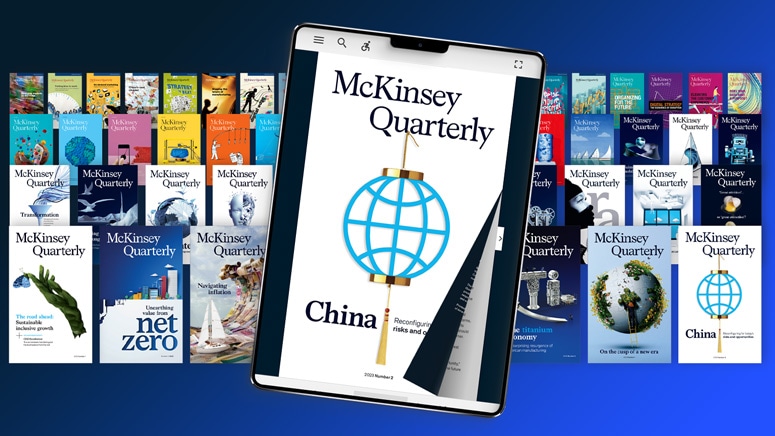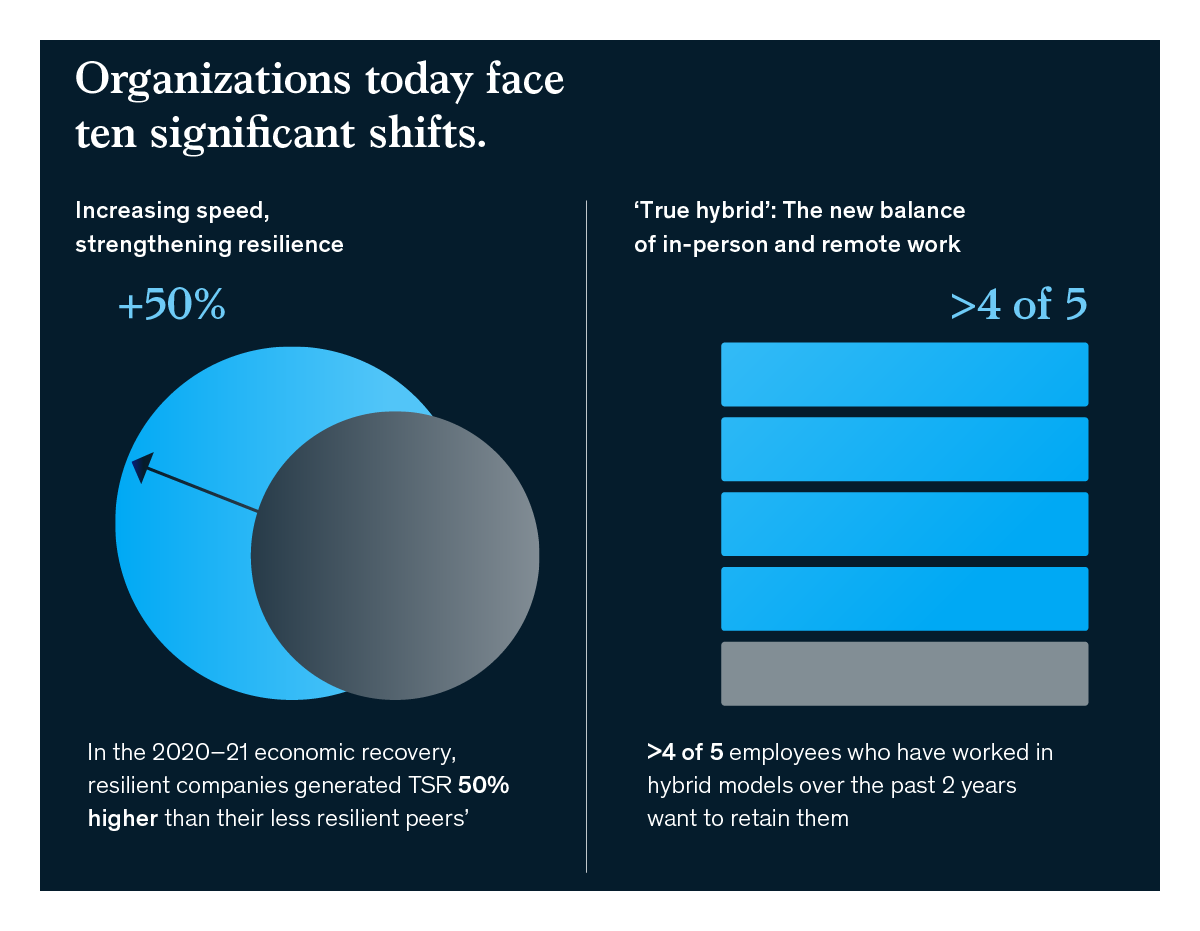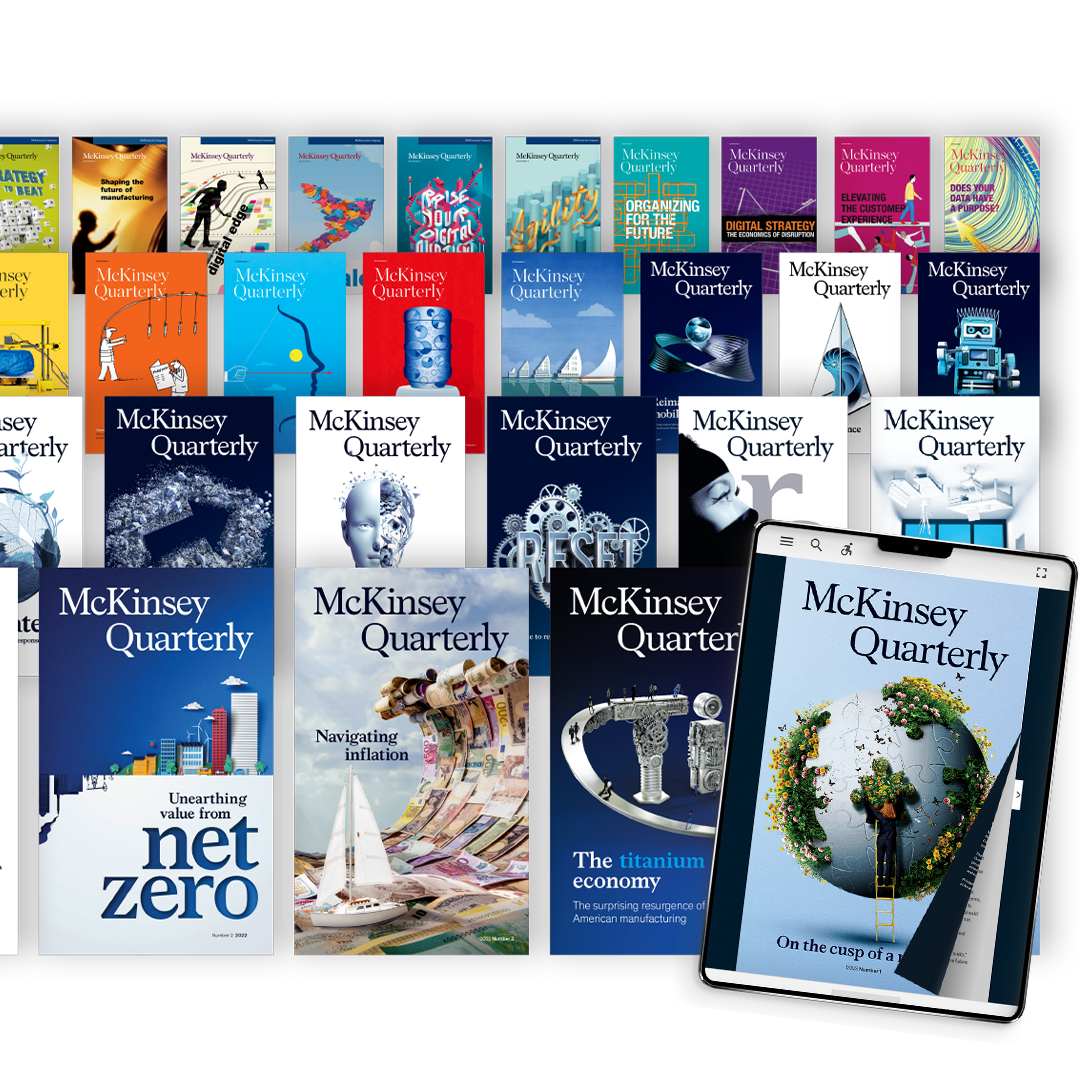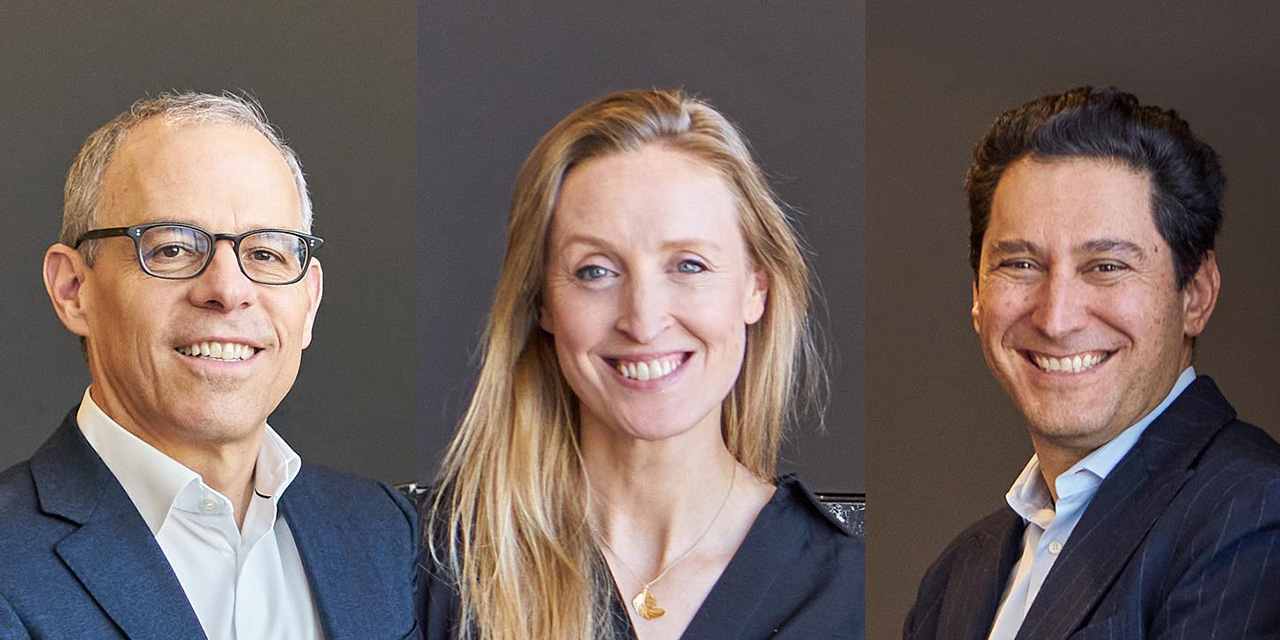Archives
- By thread 5315
-
By date
- June 2021 10
- July 2021 6
- August 2021 20
- September 2021 21
- October 2021 48
- November 2021 40
- December 2021 23
- January 2022 46
- February 2022 80
- March 2022 109
- April 2022 100
- May 2022 97
- June 2022 105
- July 2022 82
- August 2022 95
- September 2022 103
- October 2022 117
- November 2022 115
- December 2022 102
- January 2023 88
- February 2023 90
- March 2023 116
- April 2023 97
- May 2023 159
- June 2023 145
- July 2023 120
- August 2023 90
- September 2023 102
- October 2023 106
- November 2023 100
- December 2023 74
- January 2024 75
- February 2024 75
- March 2024 78
- April 2024 74
- May 2024 108
- June 2024 98
- July 2024 116
- August 2024 134
- September 2024 130
- October 2024 141
- November 2024 171
- December 2024 115
- January 2025 216
- February 2025 140
- March 2025 220
- April 2025 233
- May 2025 239
- June 2025 303
- July 2025 127
-
Is your organization resilient—and ready for the future?
On Point
Planning for periods of uncertainty Brought to you by Liz Hilton Segel, chief client officer and managing partner, global industry practices, & Homayoun Hatami, managing partner, global client capabilities
— Edited by Joy Merten, editor, Chicago
This email contains information about McKinsey's research, insights, services, or events. By opening our emails or clicking on links, you agree to our use of cookies and web tracking technology. For more information on how we use and protect your information, please review our privacy policy.
You received this email because you subscribed to the On Point newsletter.
Copyright © 2023 | McKinsey & Company, 3 World Trade Center, 175 Greenwich Street, New York, NY 10007
by "McKinsey On Point" <publishing@email.mckinsey.com> - 10:11 - 7 Jun 2023 -
Reimagining economic growth in Africa: Turning diversity into opportunity
Download the full report Share these insights
This email contains information about McKinsey's research, insights, services, or events. By opening our emails or clicking on links, you agree to our use of cookies and web tracking technology. For more information on how we use and protect your information, please review our privacy policy.
You received this email because you subscribed to our McKinsey Global Institute alert list.
Copyright © 2023 | McKinsey & Company, 3 World Trade Center, 175 Greenwich Street, New York, NY 10007
by "McKinsey Global Institute" <publishing@email.mckinsey.com> - 04:57 - 7 Jun 2023 -
Do consumers really care about ESG?
Re:think
Do consumers support sustainability claims? We know that consumers say they care about sustainability and other environmental, social, and governance (ESG) issues. All the consumer sentiment surveys show that. And consumer-packaged-goods (CPG) companies are motivated to pursue ESG strategies for lots of reasons beyond consumer demand: their investors care about it, their channel partners care about it, regulators care about it, and it’s the right thing to do.
But one frustration for CPG executives who are trying to support decisions about ESG-related investments has been a lack of broad-based spending data on this issue. Do consumers actually back their good intentions with their wallets?
We launched a study to find out. We collaborated with NielsenIQ, which has agreements with retailers under which it can obtain sales data from point-of-sale systems. Our study looked at almost half a trillion dollars of consumer spending over the past five years, across more than 30 CPG categories. The data set tagged 93 different claims relating to sustainability, or broader ESG concepts, on product labels—claims like “eco-friendly” and “fair trade.” We compared sales of products labeled with these types of claims with sales of similar products without any claims.
The biggest takeaway from the study results is that when you look across that broad set of purchases, there’s a clear link between ESG-related claims and sales growth. Products that didn’t have ESG-related claims on their labels grew, on average, 4.7 percent per year over the course of the past five years, while products that did have ESG claims grew 6.4 percent. In CPG, which generally grows in line with the economy, that delta is huge. Importantly, we also found that putting more than one ESG-related claim on a product label correlated with two times greater growth than putting only one claim on the label. It doesn’t seem like we’ve hit diminishing returns on this.“Products that didn’t have ESG-related claims on their labels grew, on average, 4.7 percent per year, while products that did have ESG claims grew 6.4 percent.”
That said, growth was not uniform. There were many categories in which products with ESG claims did not outperform. And we didn’t find a silver-bullet claim that was universally successful across categories. A specific claim that performed well in one category often didn’t perform as well in others. Still, our analysis holds that if a company creates environmentally and socially responsible products across its portfolio, it can have confidence that it should be rewarded in the aggregate by consumer demand.
One hypothesis we had going in was that niche brands and higher-priced products making ESG claims would perform better because the claims might be more integrated with their brand propositions. But while many such products did perform well, it turned out that private-label products (meaning store brands, which tend to be less expensive) with ESG claims correlated with the most consistent growth upside. Eighty percent of such products outperformed competitors that did not make ESG claims. This was in line with what we saw from NielsenIQ’s additional panel research, which involved speaking with consumer households to understand the “why” behind the numbers. The panel research found that ESG is relevant to all kinds of consumers across generations, incomes, ethnicities, and regions, so it matters for products up and down the price ladder.
The study did not investigate the veracity or impact of claims that were made on product labels. But it’s important to emphasize that this is not just about slapping a claim on a product and seeing what sells. What shows up on a product label must be rooted in authenticity and the real-world impact a company is delivering. Consumers are approaching the point of zero tolerance for greenwashing, and when you think about how quickly word travels on social media, and the power of consumers to boycott a brand, companies face significant risks if they attempt to make claims that aren’t grounded in genuine actions.
Companies should ask themselves what they stand for. Are they trying to drive decarbonization? Are they trying to drive fair labor practices? Human wellness? Product claims need to flow from these things. If you stand for something as a company, and have real impact, you ought to bring that forth in your products where appropriate. If you do, consumers have shown that they are willing to spend their dollars disproportionately on those products. What I hope companies take from this is that, when they look across their product portfolio, they’ll see many opportunities to have a positive impact on the world while also appealing to customer demand. The old adage that a company can do well by doing good appears to be as true as ever.ABOUT THE AUTHOR
MORE FROM THIS AUTHOR
UP NEXTEric Lamarre on generative AI
To pave the way for all that generative AI has to offer, companies need to rewire how they work. There will need to be an evolution at multiple levels in the tech stack—but also in the workforce.
This email contains information about McKinsey’s research, insights, services, or events. By opening our emails or clicking on links, you agree to our use of cookies and web tracking technology. For more information on how we use and protect your information, please review our privacy policy.
You received this email because you subscribed to our McKinsey Quarterly alert list.
Copyright © 2023 | McKinsey & Company, 3 World Trade Center, 175 Greenwich Street, New York, NY 10007
by "McKinsey Quarterly" <publishing@email.mckinsey.com> - 02:58 - 7 Jun 2023 -
Shoppers expect personalization. How can leaders deliver value while retaining trust?
On Point
Tips to avoid being creepy Brought to you by Liz Hilton Segel, chief client officer and managing partner, global industry practices, & Homayoun Hatami, managing partner, global client capabilities
• Warm and fuzzy. Consumers associate personalization with positive experiences that make them feel special, according to a recent study by McKinsey senior partner Kelsey Robinson and coauthors. When companies use data to adjust messages to specific users’ preferences, it confers real advantages. Done well, personalization can reduce customer acquisition costs by up to 50%, lift revenues by 5 to 15%, and increase marketing ROI by 10 to 30%. Personalized experiences can also boost customer loyalty and a company’s gross sales.
— Edited by Belinda Yu, editor, Atlanta
This email contains information about McKinsey's research, insights, services, or events. By opening our emails or clicking on links, you agree to our use of cookies and web tracking technology. For more information on how we use and protect your information, please review our privacy policy.
You received this email because you subscribed to the On Point newsletter.
Copyright © 2023 | McKinsey & Company, 3 World Trade Center, 175 Greenwich Street, New York, NY 10007
by "McKinsey On Point" <publishing@email.mckinsey.com> - 12:22 - 7 Jun 2023 -
API Trends, Insights, Events, and More!
SmartBear
SmartBear's Monthly API NewsletterHi Abul,
We're back with our monthly API newsletter! Let's dive into this month's API trends, insights, and events.
 Hot Off the PressJoin Us at SmartBear Connect
Hot Off the PressJoin Us at SmartBear Connect
Our biggest customer event is back! Where development teams go to make each release better than the last. API Innovative Insights
API Innovative Insights Become an expert on the latest updates and trends
Become an expert on the latest updates and trends
 Want to Learn More?
Want to Learn More?
Check out what else has been happening at SmartBear
BLOGUnleashing the Power of Kafka with SwaggerHub ExploreIn our recent blog, we walk you through why it’s important to understand EDA’s using SwaggerHub Explore BLOGUsing Event-Driven AsyncAPI Specifications with SwaggerHubSee how we've increased support in SwaggerHub and across the tooling portfolio
BLOGUsing Event-Driven AsyncAPI Specifications with SwaggerHubSee how we've increased support in SwaggerHub and across the tooling portfolio WEBINARAPI Exploration for DesignersJoin us to learn some best practices for incorporating API exploration into existing developer activities
WEBINARAPI Exploration for DesignersJoin us to learn some best practices for incorporating API exploration into existing developer activities WEBINARMaintaining Quality in API TestingJoin us and learn how to streamline API testing processes while maintaining a high level of quality in a cost-effective manner
WEBINARMaintaining Quality in API TestingJoin us and learn how to streamline API testing processes while maintaining a high level of quality in a cost-effective manner
 Get contract testing certified!New to contract testing?Complete the three part SmartBear Academy contract testing course and get certified!
Get contract testing certified!New to contract testing?Complete the three part SmartBear Academy contract testing course and get certified!
Designed for software developers and their teams, you’ll learn the basics of contract testing, the Pact framework and implementing PactFlow. Anyone can sign up and complete the PactFlow SmartBear Academy courses free of charge.

Best,
The API Lifecycle Team
P.S. If you found this email helpful, forward it to a friend! If you have ideas of how we can improve next month’s newsletter, reply back to let us know.Ready to try our newest API client? Sign up for the Free Tool Now! This email was sent to info@learn.odoo.com by SmartBear Software, 450 Artisan Way, Somerville, MA. 02145, 617684.2600, www.smartbear.com. We hope you found this email of interest. However, we value your privacy. If you do not wish to receive future correspondence from us, please click here to manage email preferences.
This email was sent to info@learn.odoo.com by SmartBear Software, 450 Artisan Way, Somerville, MA. 02145, 617684.2600, www.smartbear.com. We hope you found this email of interest. However, we value your privacy. If you do not wish to receive future correspondence from us, please click here to manage email preferences.
by "The API Lifecycle Team" <api-lifecycle-team@smartbearmail.com> - 08:58 - 6 Jun 2023 -
Upcoming webinar: Future-Proof Your AI Strategy
Upcoming webinar: Future-Proof Your AI Strategy
Register now and learn about tomorrow's AI, today.
Preparing the Foundation for the AI of Tomorrow
Wednesday, June 21, 2023
9:00am - 10:00am PDTRegister now 

To future-proof AI investments and strategies, businesses must start early, identify desired business outcomes, actively build internal capabilities, and roll advanced AI techniques out across the entire organization. In this webinar, experts from ABI Research and Intel will take a deep dive into these topics and explore 4 principles for future-proofing your AI investments, strategy, and infrastructure.
Register now 
Presented By

Kavitha Prasad
VP and GM, Data AI Cloud & Enterprise Strategy (DACES), Intel Corporation

Malik Saadi
Managing Director and VP, Strategic Technology, ABI Research





If you forward this email, your contact information will appear in any auto-populated form connected to links in this email.
This was sent to info@learn.odoo.com because you are subscribed to Webinars. To view and manage your marketing-related email preferences with Intel, please click here.
© 2023 Intel Corporation
Intel Corporation, 2200 Mission College Blvd., M/S RNB4-145, Santa Clara, CA 95054 USA. www.intel.com
Privacy | Cookies | *Trademarks | Unsubscribe | Manage Preferences
by "Intel Corporation" <intel@plan.intel.com> - 02:02 - 6 Jun 2023 -
Last chance to join! Webinar: The global HR stack to power fast and compliant expansion starts in less than 1 hour
Last chance to join! Webinar: The global HR stack to power fast and compliant expansion starts in less than 1 hour
Join industry leaders from Remote, Mercury, Carta, and Hired to learn about the essential software tools and technologies to successfully hire abroad and enter new markets.Hi MD,
Today’s webinar “The global HR stack to power fast and compliant expansion”, starts at less than 1hr and we would love you to join us.
In this exclusive online event, you will learn about the essential software tools and technologies that can support your organization in successfully hiring abroad and entering new markets.
Our expert panel includes
- Sam Halstead, Principal, Business Development - Platform Integrations at Remote.
- Erica Yamamoto, SVP Marketing at Hired.
- Josh Steinfeld, Principle Product Strategist at Carta.
- Veronica Pohls, VP of People at Mercury.
We'll be discussing best practices for leveraging HR tech solutions to effectively manage global teams in new markets. Don't miss out on this opportunity to future-proof your expansion strategy and provide your company with a foundation that can support a multi-country workforce.
Grow your headcount
without the headaches.




You received this email because you are subscribed to News & Offers from Remote Technology, Inc.
Update your email preferences to choose the types of emails you receive.
Unsubscribe from all future emailsRemote Technology, Inc.
Copyright © 2023 Remote Technology, Inc. All rights reserved.
18 Bartol St. #1163 San Francisco California
by "Remote" <hello@remote-comms.com> - 12:00 - 6 Jun 2023 -
คุณมีเวลาเพียง 5 นาทีไหม?
Schneider Electric
คุณมีเวลาเพียง 5 นาทีไหม? เริ่มการฝึกอบรมการฝึกอบรมที่ยืดหยุ่นของเราครอบคลุมทุกระดับโปรแกรมพันธมิตรและความเชี่ยวชาญให้เครื่องมือสำหรับการเติบโตของธุรกิจและความสำเร็จที่มากขึ้น การเริ่มต้นใช้งานง่ายและรวดเร็วคุณต้องการเรียนรู้อะไรเติบโตธุรกิจของคุณโดยเพิ่มความเข้าใจในแนวโน้มตลาดล่าสุดสร้างการฝึกอบรมบริการพลังงานที่ได้รับการจัดการอย่างรวดเร็วและมั่นใจหรือเติบโตในปัจจุบันของคุณค้นพบสถาปัตยกรรมการระบายความร้อนของศูนย์ข้อมูล - ทั้งแบบดั้งเดิมและใหม่ - และเรียนรู้วิธีการแนะนำโซลูชั่นเหล่านี้ให้กับลูกค้าของคุณ+ Lifecycle Services From energy and sustainability consulting to optimizing the life cycle of your assets, we have services to meet your business needs. Schneider Electric
46 Rungrojthanakul Building. 1st, 10th, 11th Floor, Ratchadapisek Road. Huaykwang
Bangkok - 10310, Thailand
Phone +662 617 5555© 2023 Schneider Electric, All Rights Reserved. Schneider Electric trademarks are owned by Schneider Electric or its affiliated companies in the United States and other countries. All other trademarks are property of their respective owners.
by "APC by Schneider Electric" <reply@se.com> - 08:16 - 6 Jun 2023 -
US consumers are becoming more financially cautious. What will they still splurge on?
On Point
Five charts on US consumers Brought to you by Liz Hilton Segel, chief client officer and managing partner, global industry practices, & Homayoun Hatami, managing partner, global client capabilities
• Going grill-less. Americans are reining in spending as higher costs and rising borrowing rates bite into household budgets. Consumers are becoming more practical, business leaders say. They’re bargain hunting, choosing the less expensive option, and cutting back on discretionary spending. One global home improvement retailer is facing flagging sales for costlier items such as household appliances and grills. In April, US retail sales ticked up 0.4% compared with the prior month; analysts had anticipated double that growth. [WaPo]
• A bit more optimistic. US consumer sentiment continues to be mixed well into the spring season, according to McKinsey partner Kari Alldredge and coauthors. The percentage of consumers who are pessimistic—that is, they expect a recession and a long road to economic recovery—has held fairly constant in the first months of 2023, at a level higher than at any point during the COVID-19 pandemic. Still, there was a small uptick in optimism: 36% of US consumers (up from 33% in March 2023) expect a quick economic rebound.
• Spending slows. For the first time in more than two years, real spending has declined. In March 2023, real spending fell 0.7% versus a year ago. Price increases have compelled most consumers to look for ways to stretch their dollars. Trading down is pervasive across all consumer segments. Even so, more than a third of survey respondents say that they’re planning to splurge on food (both in restaurants and at grocery stores), travel, and apparel. See five charts that illuminate the latest US consumer preferences.
— Edited by Belinda Yu, editor, Atlanta
This email contains information about McKinsey's research, insights, services, or events. By opening our emails or clicking on links, you agree to our use of cookies and web tracking technology. For more information on how we use and protect your information, please review our privacy policy.
You received this email because you subscribed to the On Point newsletter.
Copyright © 2023 | McKinsey & Company, 3 World Trade Center, 175 Greenwich Street, New York, NY 10007
by "McKinsey On Point" <publishing@email.mckinsey.com> - 12:36 - 6 Jun 2023 -
Stay on Track: Important Fleet Reminders for a Smooth Operation Across Industries
Stay on Track: Important Fleet Reminders for a Smooth Operation Across Industries
Improve reliability and uptime through proactive maintenance scheduling across multiple industries.Improve reliability and uptime through proactive maintenance scheduling across multiple industries.
Use Cases Across Industries
Construction
Harsh operating conditions lead to increased wear and tear on construction fleet and equipment. Tracking maintenance schedules and ensuring compliance with safety regulations is challenging. Set reminders for preventive maintenance and safety inspections based on time, or engine hours.

Emergency and Security
High-stress conditions and constant standby operation increase wear and tear on emergency fleet vehicles. Maintaining the readiness and reliability of emergency vehicles is crucial for prompt emergency response. Set reminders based on mileage or time intervals for maintenance tasks.

Trucking
Commercial trucks experience accelerated wear and tear due to extensive mileage and heavy loads. Managing maintenance schedules for a large truck fleet is complex and time-consuming. Set reminders based on mileage, engine hours, or time intervals.

Discuss your use-case to get your business growing


Uffizio Technologies Pvt. Ltd., 4th Floor, Metropolis, Opp. S.T Workshop, Valsad, Gujarat, 396001, India
by "Sunny Thakur" <sunny.thakur@uffizio.com> - 12:30 - 6 Jun 2023 -
Rice for Gold Exchange
Dear Sir/MadamI write to enquire if your company can supply rice to war region
(Goma, in Congo Drc)
We do not have cash money for payment, but we have raw Gold for an exchange.
Regards,
by "David" <davidmoussavou@sendgrid.net> - 07:24 - 5 Jun 2023 -
Forward Thinking on the brave new world of generative AI with Ethan Mollick
Understand the impact New from McKinsey Global Institute

Forward Thinking on the brave new world of generative AI with Ethan Mollick
Understand the impact Prefer audio? Listen to the podcast, and explore past episodes of the Forward Thinking podcast. Subscribe via Google Podcasts, Apple Podcasts, Spotify, Stitcher, or Amazon Music.


Share these insights
This email contains information about McKinsey's research, insights, services, or events. By opening our emails or clicking on links, you agree to our use of cookies and web tracking technology. For more information on how we use and protect your information, please review our privacy policy.
You received this email because you subscribed to our McKinsey Global Institute alert list.
Copyright © 2023 | McKinsey & Company, 3 World Trade Center, 175 Greenwich Street, New York, NY 10007
by "McKinsey Global Institute" <publishing@email.mckinsey.com> - 12:15 - 5 Jun 2023 -
Bad Google Review Deletion
Hi I am trying to get in touch with you regarding your negative or unwanted Google reviews. We remove negative and fake reviews permanently from Google, Facebook, Trustpilot, Glassdoor and many more platforms . There is NO UPFRONT PAYMENT to get started with our service. You will only pay after we remove the review. Please reply to this email for more information. Yours Sincerely Candy Smith _________________________________________________________ Please ask to be NO if you are not interested.
by "Candy Smith" <info@crunchmedia.com> - 11:26 - 5 Jun 2023 -
Revving up your organization: A leader’s guide
In top gear Brought to you by Liz Hilton Segel, chief client officer and managing partner, global industry practices, & Homayoun Hatami, managing partner, global client capabilities
Leading organizations have always known that they need to act fast to outpace competitors. But the COVID-19 pandemic forced businesses to move at a pace that they had likely never attained or even imagined before. For example, a US-based retailer launched curbside delivery in two days versus a planned target of 18 months, and an engineering firm designed and made ventilators within a week. Such extraordinary bursts of speed are difficult to achieve and sustain over the long term, however, unless organizations hardwire faster decision making and processes into their operating models. This week, let’s explore some of these permanent structural changes.
Most organizations can’t wait to get going on exciting new projects. But it’s all too easy for that initial burst of enthusiasm to dissipate quickly, warn McKinsey partners Louisa Greco and Zachary Silverman in an article on why speed is critical in business transformations. Entrenched behaviors and practices can leave companies “stuck in the starting blocks, wasting valuable time, energy, and momentum,” the authors say. Instead, pursuing quick wins can spark optimism and lead to longer-term investments. Our research shows that successful transformations launch initiatives that deliver 57 percent of value within six months and 74 percent by the end of the first year. Then, “in year two of a transformation, look for new value-creation opportunities and make sure incentives reflect these refreshed goals and commitments,” the authors suggest.
That’s the percentage of fast organizations that outperform their industry peers on innovation. By contrast, just 15 percent of slower organizations do the same, according to our research. Companies that act fast do so because of their adept use of technology and tactics such as a sharper focus on customers, swift decision making, and frequent and transparent communication. They score better than their competitors not only on speed of innovation but also on a host of other measures, including growth, operational resiliency, and financial performance.
That’s what companies have learned from the “forced acceleration” of organizational processes that the COVID-19 pandemic triggered, suggest McKinsey global managing partner Bob Sternfels and colleagues. In a series of blogs, the authors review nine actions to sustain that speed: these include revamping ways of working, redesigning organizational structures, and building new workforce capabilities. During the pandemic, a company took on the challenge of manufacturing a product it had never made before. “We came as beginners and got smart on the job,” a team member says. “Being a band of beginners means if you think of it, you do it. There is no time for rank.”
It’s no secret that many start-ups tend to be more nimble than larger, established players. “The biggest thing that makes most start-ups move really quickly is urgency,” says McKinsey partner Brian Quinn in a discussion with partner Stacey Haas and leading entrepreneurs. “They are running on the amount of capital and the amount of funding they have at any given moment. . . . And that level of urgency, that degree of fuel to move quickly, just doesn’t exist inside most large organizations that I’ve worked with.” Foot-dragging on decision making often slows down larger companies. One way to solve this may be to set up dedicated project teams and “force this notion that they’re going to make decisions quickly on a daily basis,” says Quinn. “That’s one of the biggest unlocks to actually moving at the speed the start-ups often move at.”
Sometimes the best way to accelerate may be to slow down. Taking extra time at the strategic planning stage could help speed up execution by enabling leaders and teams to focus on the right priorities. “You can do a lot of damage by getting ahead of yourself,” cautions McKinsey senior partner Marc Singer. “Test in a sandbox of appropriate size and then have a plan for scaling that mitigates risks.” And in a crisis, it may be better to pause rather than act in haste, in the view of McKinsey senior partner Aaron De Smet. “If you are in an uncertain situation, the most important thing you can do is calm down,” he says. “Take a breath. Take stock. . . . If you’re in new territory, the thing you would normally do might not be the right thing.”
Lead with speed.
— Edited by Rama Ramaswami, senior editor, New York
Share these insights
Did you enjoy this newsletter? Forward it to colleagues and friends so they can subscribe too. Was this issue forwarded to you? Sign up for it and sample our 40+ other free email subscriptions here.
This email contains information about McKinsey’s research, insights, services, or events. By opening our emails or clicking on links, you agree to our use of cookies and web tracking technology. For more information on how we use and protect your information, please review our privacy policy.
You received this email because you subscribed to the Leading Off newsletter.
Copyright © 2023 | McKinsey & Company, 3 World Trade Center, 175 Greenwich Street, New York, NY 10007
by "McKinsey Leading Off" <publishing@email.mckinsey.com> - 02:48 - 5 Jun 2023 -
US productivity growth has slowed. Can the nation realize a more prosperous future?
On Point
What seven states have in common Brought to you by Liz Hilton Segel, chief client officer and managing partner, global industry practices, & Homayoun Hatami, managing partner, global client capabilities
• Sluggish growth. US labor productivity has grown at a sluggish 1.4% since 2005. Returning productivity to its historical level would add $10 trillion to US GDP, explain McKinsey Global Institute (MGI) director Olivia White and McKinsey partner Charles Atkins. Only seven US states have had above-average productivity and above-average productivity growth for the past decade or so. That’s somewhat puzzling, since in a unified market, one might expect to see mobility of labor and the spreading of ideas and productive practices.
— Edited by Belinda Yu, editor, Atlanta
This email contains information about McKinsey's research, insights, services, or events. By opening our emails or clicking on links, you agree to our use of cookies and web tracking technology. For more information on how we use and protect your information, please review our privacy policy.
You received this email because you subscribed to the On Point newsletter.
Copyright © 2023 | McKinsey & Company, 3 World Trade Center, 175 Greenwich Street, New York, NY 10007
by "McKinsey On Point" <publishing@email.mckinsey.com> - 12:22 - 5 Jun 2023 -
Bad Google Review Deletion
Hi I am trying to get in touch with you regarding your negative or unwanted Google reviews. We remove negative and fake reviews permanently from Google, Facebook, Trustpilot, Glassdoor and many more platforms . There is NO UPFRONT PAYMENT to get started with our service. You will only pay after we remove the review. Please reply to this email for more information. Yours Sincerely Laura Jayne _________________________________________________________ Please ask to be NO if you are not interested.
by "Laura Jayne" <info@clickcreators.com> - 02:54 - 4 Jun 2023 -
The week in charts
The Week in Charts
Ten shifts transforming organizations, commercial satellite constellations, and more Share these insights
Did you enjoy this newsletter? Forward it to colleagues and friends so they can subscribe too. Was this issue forwarded to you? Sign up for it and sample our 40+ other free email subscriptions here.
This email contains information about McKinsey's research, insights, services, or events. By opening our emails or clicking on links, you agree to our use of cookies and web tracking technology. For more information on how we use and protect your information, please review our privacy policy.
You received this email because you subscribed to The Week in Charts newsletter.
Copyright © 2023 | McKinsey & Company, 3 World Trade Center, 175 Greenwich Street, New York, NY 10007
by "McKinsey Week in Charts" <publishing@email.mckinsey.com> - 03:39 - 3 Jun 2023 -
Ushering in a new era of leadership
Plus, the CEO’s guide to generative AI What does leadership look like in an era where turbulence and disruption are the norm? It’s not the model we’re used to. In this month’s first featured story from the McKinsey Quarterly, Aaron De Smet, Arne Gast, Johanne Lavoie, and Michael Lurie dive into the transition from an era of individual leaders to an era of networked leadership teams that steer the organization, as well as the five fundamental evolutionary shifts leaders are called to make in their mindsets and ways of working. In our second featured story from the Quarterly, Blair Epstein, Caitlin Hewes, and Scott Keller define what it means to operate as one firm—that is, hearing “we, us, and our” language versus “me, mine, and theirs,” and fostering one brand identity and a “firm way” of doing things—and discuss what it takes to overcome entrenched identities and power dynamics to successfully shift to a one-firm operating model. Other highlights in this month’s issue include the following topics:
• how CEOs and their teams can reflect on the value creation case for generative AI
• what the future might hold for the world’s balance sheet
• why companies that adopt a continuous-listening strategy stand to build a distinct competitive advantage
• what a healthy life span can mean in a world that is growing older

What every CEO should know about generative AI
Generative AI is evolving at record speed while CEOs are still learning the technology’s business value and risks. Here, we offer some of the generative AI essentials.
Learn the essentials
The future of wealth and growth hangs in the balance
The past two decades have generated $160 trillion in paper wealth but sluggish growth and rising inequality. What comes next?
4 scenarios
The next competitive advantage in talent: Continuous employee listening
People analytics can provide real-time insights. Here’s how leaders can use them to identify critical needs, make decisions more quickly, and strengthen their employee value propositions.
Leverage the power of people
Age is just a number: How older adults view healthy aging
The results of a survey from the McKinsey Health Institute shed light on the health perceptions and priorities of people aged 55 and older.
Read more
The beauty market in 2023: A special State of Fashion report
The glow of the beauty industry has proved hard to resist, attracting many new companies and investors. Brands must make differentiating choices to find success in this shifting and increasingly competitive landscape.
Develop tailored strategies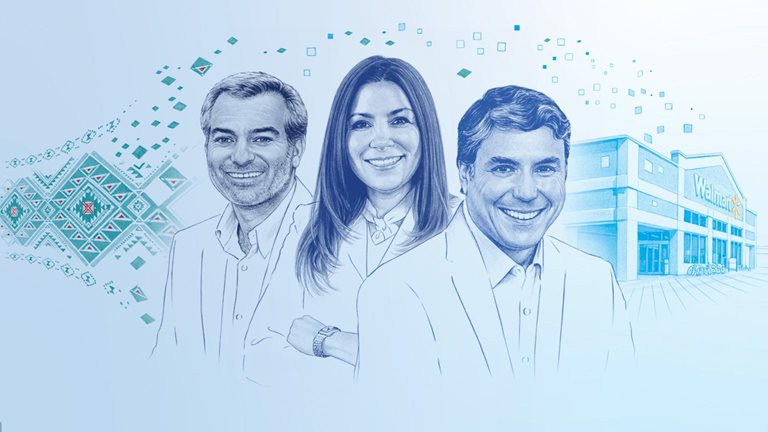
Looking within: How Walmart in Mexico changed everything for an omnichannel future
The executive committee at Walmex had to lead differently to take the company into the digital age. They reflect on the changes in the organization and in themselves.
Reinvent yourself
McKinsey Explainers
Find direct answers to complex questions, backed by McKinsey’s expert insights.
Learn more
McKinsey Themes
Browse our essential reading on the topics that matter.
Get up to speed
McKinsey on Books
Explore this month’s best-selling business books prepared exclusively for McKinsey Publishing by Circana.
See the lists
McKinsey Chart of the Day
See our daily chart that helps explain a changing world—as we strive for sustainable, inclusive growth.
Dive in
McKinsey Classics
For ways businesses can identify risk aversion and root out the biases that can stymie potential investment projects, read McKinsey partner Tim Koller’s 2012 classic “Overcoming a bias against risk.”
Rewind
Get your Daily Read
Our must-read insights of the day, delivered to your inbox Monday through Friday.
Subscribe now—Edited by Eleni Kostopoulos, managing editor, New York
Share these insights
Did you enjoy this newsletter? Forward it to colleagues and friends so they can subscribe too. Was this issue forwarded to you? Sign up for it and sample our 40+ other free email subscriptions here.
This email contains information about McKinsey's research, insights, services, or events. By opening our emails or clicking on links, you agree to our use of cookies and web tracking technology. For more information on how we use and protect your information, please review our privacy policy.
You received this email because you are a registered member of our Monthly Highlights newsletter.
Copyright © 2023 | McKinsey & Company, 3 World Trade Center, 175 Greenwich Street, New York, NY 10007
by "McKinsey Highlights" <publishing@email.mckinsey.com> - 11:15 - 3 Jun 2023 -
Bad Google Review Deletion
Hi I am trying to get in touch with you regarding your negative or unwanted Google reviews. We remove negative and fake reviews permanently from Google, Facebook, Trustpilot, Glassdoor and many more platforms . There is NO UPFRONT PAYMENT to get started with our service. You will only pay after we remove the review. Please reply to this email for more information. Yours Sincerely Laura Jayne _________________________________________________________ Please ask to be NO if you are not interested.
by "Laura Jayne" <info@clickcreators.com> - 05:04 - 2 Jun 2023 -
Start strong; stay strong
The Shortlist
Four new insights Curated by Liz Hilton Segel, chief client officer and managing partner, global industry practices, & Homayoun Hatami, managing partner, global client capabilities
Twice monthly, we bring you four new insights out of the dozens we publish that we think are worth a second glance from any business leader in any geography. In this edition, we look at staying strong midway through a stint as CEO, how to parse economic data, and more. We hope you enjoy the read.
—Liz and Homayoun
Are we there yet? With digital transformation, the work is never done. Technology changes too quickly; the power to transform is a muscle that needs to be strengthened constantly. That’s just one of the insights from the new book Rewired: The McKinsey Guide to Outcompeting in the Age of Digital and AI. McKinsey senior partners Eric Lamarre, Kate Smaje, and Rodney Zemmel have reverse-engineered successful digital transformations to break down what works and what doesn’t.
Share these insights
This email contains information about McKinsey’s research, insights, services, or events. By opening our emails or clicking on links, you agree to our use of cookies and web tracking technology. For more information on how we use and protect your information, please review our privacy policy.
You received this email because you subscribed to The Shortlist newsletter.
Copyright © 2023 | McKinsey & Company, 3 World Trade Center, 175 Greenwich Street, New York, NY 10007
by "McKinsey Shortlist" <publishing@email.mckinsey.com> - 04:20 - 2 Jun 2023










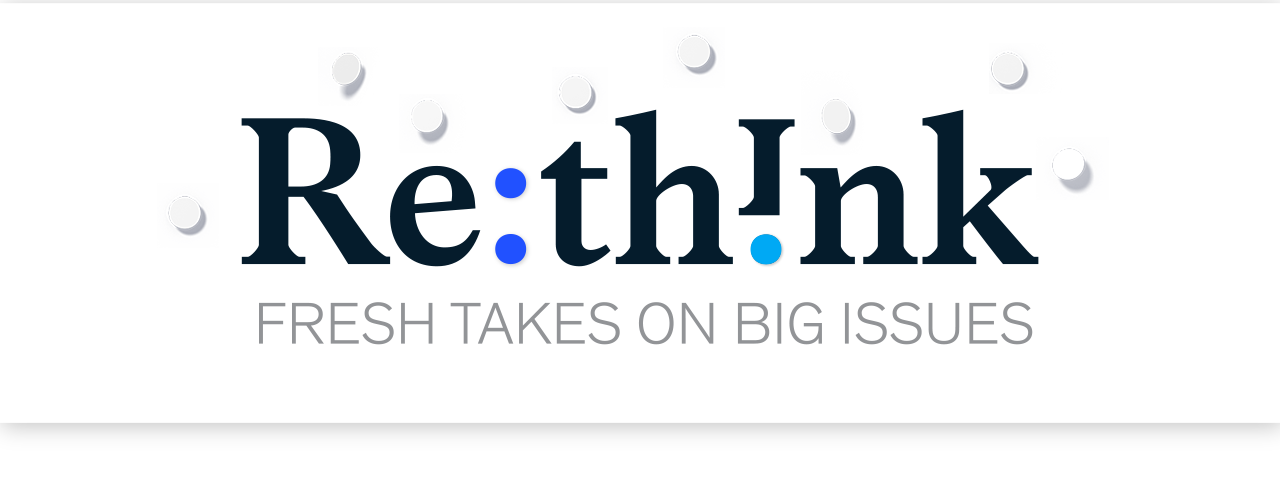
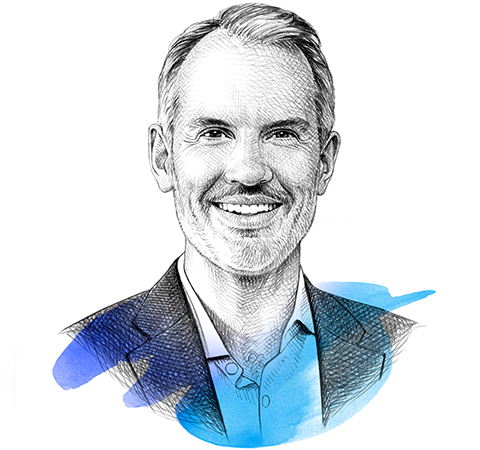


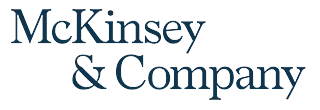








.png?width=1200&upscale=true&name=Group%201%20(6).png)





.png?width=1200&upscale=true&name=reminder_usecases1%20(1).png)









